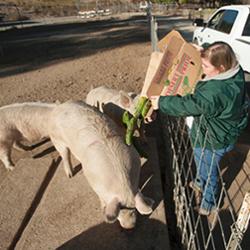Discarded Produce Helps Save Money, Puts Livestock in Hog Heaven

The hogs could hear and see the white pickup truck driving slowly down the dirt lane toward their pen.
They clustered at the corner, stamping their feet and pushing against the fencing, oinking furiously in anticipation. They watched eagerly as agricultural science senior Kelsey Swayze got out of the truck and took a cardboard box from the truck bed. She opened the package and upended it, spilling green cucumbers on the ground among the pigs.
“This is a treat on top of their regular hog diet,” Swayze said as the hogs gorged on the vegetables.
The special treat is just one way that the College of Agriculture is practicing sustainability ─ and saving a little money.
The cucumbers came courtesy of Heart of Compassion Distribution, a nonprofit organization that provides fresh fruit, vegetables and other sustenance to food banks, shelters, veterans, seniors, and city and school programs throughout Southern California.
But sometimes, the produce exceeds its quality or expiration date and isn’t fit for humans. The organization contacted the College of Agriculture to see if it could use the produce.
The college decided to use it to supplement the diets of its livestock, which include cattle, about 60 pigs and 300 sheep. Every couple of weeks, the college picks up several tons of produce from Heart of Compassion.
“Cucumbers, carrots, lettuce – every week it’s different,” said Brad Foyil, the sheep and swine unit manager
Professor Broc Sandelin, chair of the animal and veterinary sciences department, said the extra produce saves the college about $400 in feed costs per month. Although the food is not fit for human use, it is still safe to feed to the livestock, he added.
“Most livestock animals are less at risk to sickness from spoilage. None of the vegetable products contain pathogens that can cause food-borne illness,” Sandelin said. “To prevent them from spoiling more or getting contaminated, we store them in a cooler or feed the vegetables to the animals soon after we get them.”
Typically, the pigs get fed twice a day with a pellet that resembles dog kibble, but gives the animals all the nutrients they need, Foyil said.
The pigs are primarily raised for nutritional research, lab classes and livestock shows, he said.
Down the road in another pasture, a flock of sheep clustered around Swayze to receive another box of cucumbers. They were used to being around humans, having done duty in the petting zoo at the L.A. County Fair.
Like the pigs, the sheep are raised for research purposes and to teach students to care for animals. Unlike the pigs, however, the sheep dug daintily into the vegetables.
“They’ll pick at it throughout the day,” Swayze said. “But the pigs – they’ll eat at any time.”
